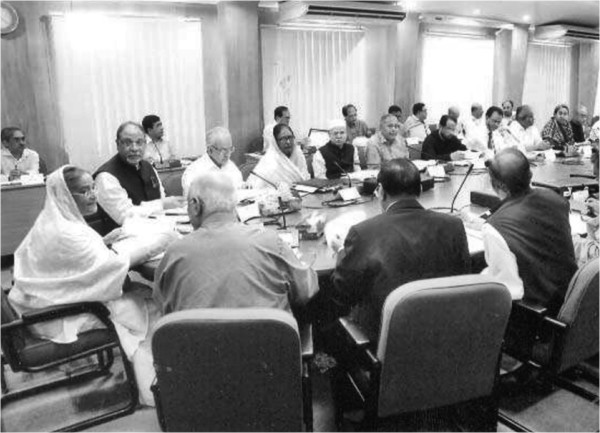 |
||||||||||||
Working democracy: A stocktaking--Dr. Kamal Hossain Politics invading culture--Serajul Islam Chowdhury Bangladesh at 40: Addressing governance challenges -- Barrister Manzoor Hasan, Dr. Gopakumar Thampi and Ms. Munyema Hasan Party government and partisan government-- Dr. Mizanur Rahman Shelley Is rule by the majority enough?-- Mohammad Abu Hena The rubric of good governance --Mohammad Badrul Ahsan For a human rights culture -- Professor Dr. Mizanur Rahman For an independent Human Rights Commission-Sayeed Ahmad Of this and that -- Sultana Kamal Tribalist corruption-- Mohammad Badrul Ahsan Fighting terrorism: Enforcement challenges--Muhammad Nurul Huda Combating corruption: People are watching-- Iftekharuzzaman E-government and its security-- Dr. M Lutfar Rahman CHT Accord: Implementation a half empty glass -- Devasish Roy Wangza Citizenship and contested identity: A case study -- Bina D'costa and Sara Hossain Forty years of "yes ministership"-- Mahbub Hussain Khan Politician-bureaucrat interface-- AMM Shawkat Ali Impartial bureaucracy: A fading dream-- Nurul Islam Anu Forty years... and diverse governments--Syed Badrul Ahsan Protect environment, save the nation--Morshed Ali Khan
|
||||||||||||
 Photo : Star |
||||||||||||
Politician-bureaucrat interface AMM Shawkat Ali The concept of political control of civil service is an admitted fact in any democratic system. The concept hinges on the premise that the elected party having the required majority to form government will be responsible for governance. At the same time, the time-honored and established practice requires that the party in power is to be aided by permanent officials of the state. The extent of political control is to be exercised by and under laws, rules and regulations adopted for the purpose. This means that political control is to be guided and governed by an appropriate regulatory framework. In practice, the extent of political control varies from country to country depending on the state of political and administrative development. In mature democracies the extent of political control is not a big issue. The reason being the politicians in power go by established rules and regulation. In developing political system, this situation, if not totally opposite, is somewhat disturbing. In both developed and developing political system, the basis of political control of civil servants rests on the perception that each political party has its own programmes and policies that it wishes to implement if voted to power. This requires a corpse of civil servants which is a true believer in its political ideology. At the same time, in both parliamentary and presidential systems of government, the existence of multiparty framework of politics is an established requirement. In most presidential form of government, the practice of spoils system took roots to ensure the perceptional issue of loyality to a party. Over time, however, this practice gave way to an open recruitment system based on mecit. Thus during the late nineties, the number of federal civil servants under spoils system was estimated to be less than 10 percent of the total number of federal civil servants. Thus, the concept of a permanent civil service which is politically neutral came to be the norm.
In democratic countries which follow the White Hall model of democracy, the long established practice is to have politically neutral civil service. Even them, in the United Kingdom (UK), there was a debate on the desirability of having spoils system in a limited form. This happened during Thatcher era. The civil service during the Conservative era under Mrs. Thatcher is perceived to have suffered for her deepseated view that radical policies require `commitment' in pushing things through Whitehall machine. She and some other members of her party saw the civil service as an `adversary'. This provides analytical review of such perception in Bangladesh context also. The former head of Mrs. Thatcher's Policy Unit, Sir John Hoskyns argued for a partial politicization of higher civil service to the extent of 20 percent of the total posts. His specific recommendation was that the outsiders to be “politically appointed to higher civil service might initially serve a political party in opposition which could with taxpayer's money, maintain a shadow team of officials who would move into departments if and when the party is in power. This was opposed by an ex-head of the Home Civil Service, Sir Douglas Wess on the ground that senior civil servants need to chasten the `Ministers' enthusiasm since the Ministers were not fully aware of the difficulties and dangers of their initiatives. Mrs. Thatcher, however, did not opt for even partial politicization. Her preference was for civil servants who embody the `can do' approach. The overall conclusion is that there is no evidence of politicization of civil service in the UK. The essential attributes of civil service in the UK and other countries with parliamentary form of government are permanency in career, anonymity and political neutrality. Permanency in career implies continuity in office till the age of superannualion subject to rules of conduct. This is in contrast to the fixed tenure of office of politicians who serve as ministers usually for five years. Their further continuance in office depends on the results of election. The second, that of anonymity for civil servants, is guided by relevant rules of conduct. Such rules prohibit civil servants to speak to the press unless authorised by the minister who remains the official spokesman for his/her ministry. By the same logic, for all actions pertaining to a ministry, the minister is answerable and accountable to the parliament and not the civil servants. Theoretically, this is known as the principle of Ministerial Responsibility. The fact, however, remains that in developing political system; this is more a myth than a reality.
The third attribute of political neutrality implies that the civil servants, working in a muti-party democratic system, must be politically neutral. This is essential because in that framework of governance, the civil servants have to serve governments of different ideologies, policies and programmes. This system is perceived to be an indispensable requirement to protect public interest which is opposite of partisan interest. It may be recalled that in the UK context, described earlier, some key references have been with regard to the political bureaucratic interface. First, the civil servant is seen as an adversary. Second, the politicians in power expect full commitment from a civil servant in matters relating to the implementation of policies and programmes. Third, there is need to chasten the enthusiasm of ministers who are not fully aware of the dangers of their initiatives. The key words described above provide some clue to a fuller understanding of the element of political control of civil servants by politicians in power. Experience has shown that in Bangladesh, the issue of political bureaucratic interface, has degenerated into what is widely known as politicisation of civil service. Political control has led to a deep-seated perception within the political community that whatever is wished by them should be implemented without any question being raised by civil servants. In contrast, the civil servants have to work within a complex web of laws, rules and regulations. It is not open to him to violate the same. Violations may invite disciplinary action. If a particular decision given by a minister runs counter to established rules and regulations, a civil servant is duty-bound to draw the attention of the minister. In a developing political system this automatically leads to an adversarial situation. Many questions are raised by some ministers. Civil servants are accused of being an obstructionist or a person with a negative mindset or even, disloyal to the party in power. In order to avoid the wrath of the minister, some civil servants do bend the rules. They are rewarded by promotion or appointment to important positions. Unfortunately, since 1991 till date, depending on the visible “loyality” to the party in power, civil servants have been rewarded or punished. Evidence of this trend have been reported by the media but to no effect. This trend in politicisation starts from the stage of recruitment to post-retirement contractual appointment to those group of candidates/civil servants who are perceived by the party in power to have an acceptable degree of loyality. The schematic design of politicisation process in shown in figure below: Note: Consequences: Debilitating effect on Civil Service morale with deleterious effect on quality and output of work. Roadblock to professionalism in Civil Service. Academics have conducted credible research on politicisation process in all its forms and manifestations. Leading newspapers have also published one editorial after another drawing on specific events that exhibit a high degree of politicisation at the stages stated above. Since 2001 till date, politicisation in the recruitment process of lower echelons of civil service has taken a highly degenerated form, that of making money on promise of securing appointment in government service. Media was quick to dub it 'Recruitment Trade'.
Such cases were reported during 2001 through 2006. This was also reported in 2010. The case of Pabna is a case in point. It happened in some other districts such as Panchager and Patuakhali also. The other form reported in 2010 is the stunning statement from an adviser to the Prime Minister that only those loyal to the party in power world be recruited. The cases of some ministers making written recommendations for appointing particular candidates have also been reported. These ministers very candidly defend their action by saying that since they are representatives of the people, the candidates approach them and they cannot ignore them. The Prime Minister, on the other hand, tenaciously clings to the salutary principle that recruitment must be made on merit. The irony is that the unwholesome practice of politicising the recruitment process has not stopped. The deeply entrenched perception of getting our men/women in civil service still persists with a highly debilitating effect on the quality of service from civil servants. In contrast, the civil servants have to work within a complex web of laws, rules and regulations. It is not open to him to violate the same. Violations may invite disciplinary action. If a particular decision given by a minister runs counter to established rules and regulations, a civil servant is duty-bound to draw the attention of the minister. In a developing political system this automatically leads to an adversarial situation. Many questions are raised by some ministers. Civil servants are accused of being an obstructionist or a person with a negative mindset or even, disloyal to the party in power. In order to avoid the wrath of the minister, some civil servants do bend the rules. They are rewarded by promotion or appointment to important positions. Unfortunately, since 1991 till date, depending on the visible “loyality” to the party in power, civil servants have been rewarded or punished. Evidence of this trend have been reported by the media but to no effect. This trend in politicisation starts from the stage of recruitment to post-retirement contractual appointment to those group of candidates/civil servants who are perceived by the party in power to have an acceptable degree of loyality. The schematic design of politicisation process in shown in figure below: Note: Consequences: Debilitating effect on Civil Service morale with deleterious effect on quality and output of work. Roadblock to professionalism in Civil Service. Academics have conducted credible research on politicisation process in all its forms and manifestations. Leading newspapers have also published one editorial after another drawing on specific events that exhibit a high degree of politicisation at the stages stated above. Since 2001 till date, politicisation in the recruitment process of lower echelons of civil service has taken a highly degenerated form, that of making money on promise of securing appointment in government service. Media was quick to dub it 'Recruitment Trade'.
Such cases were reported during 2001 through 2006. This was also reported in 2010. The case of Pabna is a case in point. It happened in some other districts such as Panchager and Patuakhali also. The other form reported in 2010 is the stunning statement from an adviser to the Prime Minister that only those loyal to the party in power world be recruited. The cases of some ministers making written recommendations for appointing particular candidates have also been reported. These ministers very candidly defend their action by saying that since they are representatives of the people, the candidates approach them and they cannot ignore them. The Prime Minister, on the other hand, tenaciously clings to the salutary principle that recruitment must be made on merit. The irony is that the unwholesome practice of politicising the recruitment process has not stopped. The deeply entrenched perception of getting our men/women in civil service still persists with a highly debilitating effect on the quality of service from civil servants. It is a sad commentary on our leaders of public opinion responsible for nation-building that they are yet to truly understand the grave and serious implications that it has on building up a nation. Further that, in this process, civil service remains the most important conduit through which policies and programmes are to be implement by a politically neutral civil service working within the bounds of a constititual framework that recognises multi-party politics. In respect of promotions the statistical data relating to cases of unjust supercessions are not easily available except for scattered reports in the media. One landmark change in the structure and processes of decision-making occurred in the post-1991 period. This was possible due to intervention by the higher judiciary. Following the intervention, the two-decade old system of council committee on promotion for promotion to higher civil service stood abolished. The old system of superior selection board (SSB) was fully revived. However, public perception still is that a merit-based promotion system is yet to be achieved. Forced retirement before the age superannuation still remains a handy tool for political victimisation of civil servants who are perceived to lack in loyality to the party in power. Worse still, the deep-seated trend is to reinstate such civil servants by another party which comes to power. This is done on the plea that when another political party was in power, a group of civil servants were unjustly deprived of promotions due to them. This cycle of setting 'wrongs' 'right' goes on. In the process, seeking support of politicians in power by civil servants for promotion has taken deep roots in civil bureaucracy. Large-scale transfer and posting of civil servants following change of government and/or before and after elections is a key feature of civil service management. This is believed to be resorted to by the party in power to gain complete 'political control' over civil servants. Abrupt and arbitrary termination of probationary period of civil servants recruited by one party has also been indentified to be one of the key stages of politicisation process. Sometimes, the system of verification of character and antecedents are misused by one government or the other to deprive some successful candidates of their right to be recruited. Intervention by the higher judiciary has been reported in such cases. Politicisation of public services is an anathema to constitutional governance. It is also antithetical to the very concept of permanent civil service protected by law. In the public eye, the public servant becomes almost indistinguishable from the party activist and peoples' faith in government is irreparably damaged. This brings into sharp focus the quintessential dichotomy between the party and the government: when the imperatives of the party or party adherents and those of the people are clearly perceive to be conflicted, the public servants' ability to uphold public interest in hopelessy compromised. With their educational background, training and experience public servants are uniquely placed to play a proactive, symbiotic or catalytic role in the resolution of conflicts and thus in promoting stability and socio-economic progress. This is particularly true in the South Asian socio-political milieu. If we delve a little deeper, it will unquestionably be evident that a strong, neutral civil service supports the growth and sustainability of better governance. The political institutions too are strengthened and energised in the process. Viewed in this perspective politicistion of services will clearly appear as self-defeating political stratagem-it destroys institutional governance so inexorably and completely. The writer is a former Secretary and Adviser, caretaker government. |
||||||||||||



